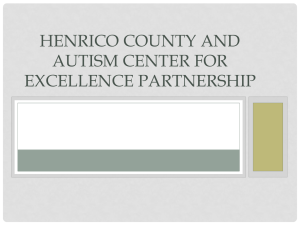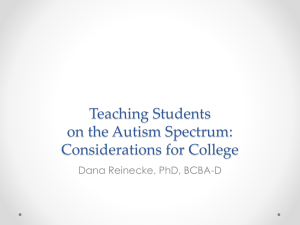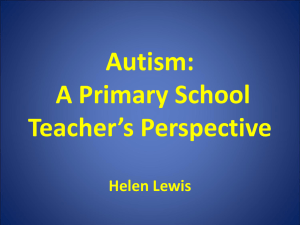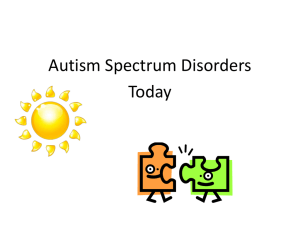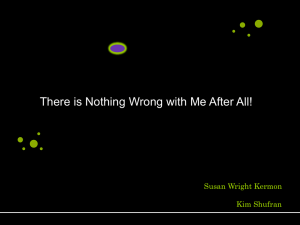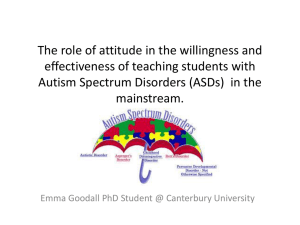Antipsychotics
advertisement
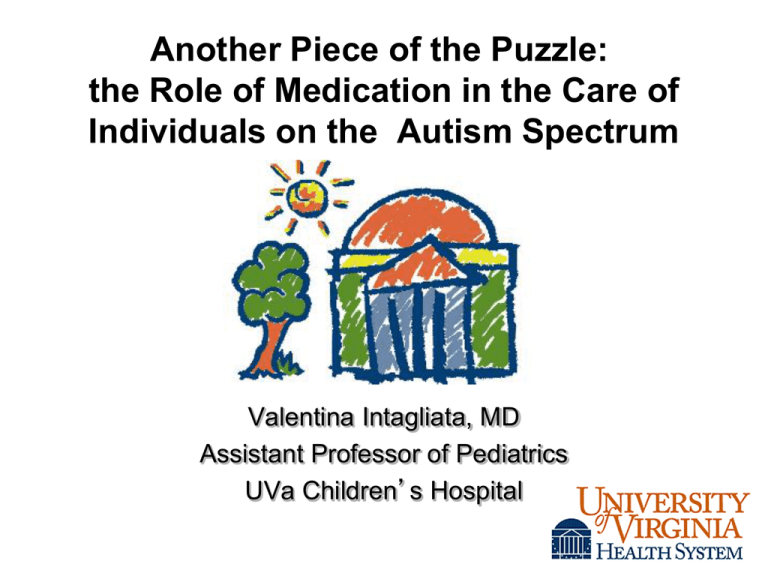
Another Piece of the Puzzle: the Role of Medication in the Care of Individuals on the Autism Spectrum Valentina Intagliata, MD Assistant Professor of Pediatrics UVa Children’s Hospital Disclaimer • I have no financial or research interests in any of the medications Objectives • Recognize target symptoms in children with ASD which can be treated with medications • Be familiar with medications used commonly in children with ASD • Be aware of the possible side-effects of these medications • Case presentations Introduction • ASD are a heterogeneous group of disorders – Clinical manifestations vary in presentation & intensity • Treatments must be individualized – Weigh potential risks & benefits Introduction • Behavioral & educational approaches are the cornerstone of comprehensive treatment for core symptoms • Medications may be a useful adjunct to treat common comorbid symptoms – after behavioral & environmental interventions have been maximized Introduction • Medications available do not directly treat core features of autism – i.e. social-communication impairments • Treat behavioral manifestations of the underlying brain pathology Introduction • Most existing evidence on medication use is extrapolated from studies on comorbid conditions (e.g. ADHD, OCD, anxiety) in children without ASD • Studies in children with ASD are generally small, retrospective & unblinded – Also, lack of diagnostic tools standardized in the ASD population Introduction • Most medications are not FDA-approved for use in children with ASD – Exceptions: • Risperidone & Aripiprazole • Methylphenidate • Many other medications are used off-label – Parents/caregivers should be informed of this Target Symptoms Target Symptoms • Behaviors that interfere with learning, health, safety, socialization, quality of life, and/or overall functioning – Aggression, irritability & self-injury – Repetitive behaviors & rigidity – Hyperactivity & inattention – Anxiety & depression – Sleep disturbance Aggression, Irritability & Self-Injury • Aggression & related disruptive behavior generally elicit the most concern in ASD • These behaviors can lead to injury & isolation • High prevalence of these symptoms (Kanne et al, 2011) • 68% to caregivers • 49% to non-caregivers Aggression, Irritability & Self-Injury Antipsychotics •Efficacy of antipsychotics in autistic children was first documented in the 1970s • Now commonly used for ASD – Risperidone & Aripiprazole are the only 2 FDA-approved agents for aggression Aggression, Irritability & Self-Injury Antipsychotics •Anderson LT & Campbell M et al, 1984 – RCT of Haloperidol (~1.7 mg/d) – Significant improvement in aggression (negativism, angry affect & mood lability) – However… • Sedation common • 1/3 children developed dystonia & withdrawal dyskinesias Aggression, Irritability & Self-Injury Antipsychotics •Risperidone was first “atypical antipsychotic” •RUPP, 2005 – RCT of Risperidone (~2.08 mg/d) – Effective in decreasing moderate-severe tantrums, aggression & self-injurious behavior – Effects stable over time w/o dose increase, but relapse w/ medication withdrawal at 6 mos Aggression, Irritability & Self-Injury Antipsychotics • Risperidone quickly became first-line treatment • FDA approved Risperidone in 2006 for autism – Ages 5-16 yo with max dose 3 mg/d Moderators and Mediators of Risperidone Effect • Higher symptom severity associated with greater improvement • Weight gain mediates treatment response negatively • Socioeconomic advantage, low baseline prolactin and absence of anxiety, bi-polar symptoms, ODD, stereotopy & hyperactivity correlates with positive outcome • Intensive behavioral intervention in addition to risperidone resulted in the best outcome in autism with aggression Aggression, Irritability & Self-Injury Antipsychotics •Aripiprazole is another “atypical antipsychotic” •Marcus RN et al, 2009 – RCT of Aripiprazole (5, 10, 15 mg/d) – All doses superior to placebo – Extrapyramidal symptoms but which rarely led to discontinuation Aggression, Irritability & Self-Injury Antipsychotics •FDA approved Aripiprazole in 2009 for autism – Ages 6-17 yo with max dose 15 mg/d •Other antipsychotics lack large-scale RCTs – Variable benefits of Olanzapine & Zipraside based on small open-label studies – Quetiapine does not appear to be beneficial Aggression, Irritability & Self-Injury Stimulants •Methylphenidate (MPH) has been examined for Tx of aggression in ASD ages 5-11 yo •Quintana H et al, 1995; Handen BL et al, 2000 – RCTs, but small & short duration – Superiority over placebo – High rate of side-effects Aggression, Irritability & Self-Injury Other Agents • Valproate showed modest superiority & min sideeffects in RCT (Hollander E, et al, 2010) • Naltrexone & Clonidine showed superiority in RCT (Parikh MS et al, 2008) • Not considered first-line agents Aggression, Irritability & Self-Injury Other Antiepileptics • • • • • • Carbamazepine (Tegretol) Gabapentin (Neurontin) Lamotrigine (Lamictal) Topiramate (Topamax) Oxcarbazepine (Trileptal) Levetiracetam (Keppra) Aggression, Irritability & Self-Injury • No clinical algorithm exists for • Clinicians generally start with lower risk alternatives • However, poor response & serious symptoms, these agents are often replaced by one of two FDA-approved antipsychotics Repetitive Behaviors & Rigidity • Restricted, repetitive & stereotyped behaviors (RRBs), interests & activities (“rigidity”) are characteristic of ASDs – Lower-level motor behaviors (e.g. rocking) – Higher-level routines/rituals (e.g. insistence on sameness) Repetitive Behaviors & Rigidity Selective Serotonin Reuptake Inhibitors •Initial use based on reports on serotoninergic dysfunction in ASD & shared symptomatology with OCD which responds to SSRIs •Most common class of psychotropics for individuals with ASD – Evidence is marginal from RCTs Repetitive Behaviors & Rigidity • Hollander et al, 2005 – RCT of Fluoxetine (~10 mg/d) – Better than placebo – 39 children 5-16 yo • SOFIA, 2011 – RCT of Fluoxetine – No benefit over placebo over 14-wks – 158 children 5-17 yo Repetitive Behaviors & Rigidity • King BH et al, 2009 – Large RCT of Citalopram (2.5-20 mg/d) – No significant difference b/w Tx & control – 149 children ages 5-17 yo – 1/3 experienced serotoninergic activation (increased activity, mood changes, insomnia) • Owley T et al, 2005 – Open-label RCT of Escitalopram – More positive effects on irritability Repetitive Behaviors & Rigidity Atypical Antipsychotics • RRBs were examined as secondary outcomes in studies discussed previously – Risperidone significantly greater reduction vs. placebo (RUPP, 2005) – Aripiprazole significantly improved RRBs vs. placebo (Marcus RN et al, 2009) Repetitive Behaviors & Rigidity Other Agents • Hollander E, et al, 2006 – Small RCT (13 individuals) of Valproate – Showed significant improvement of RRBs/rigidity vs. placebo Repetitive Behaviors & Rigidity • RRBs/rigidity constitute frequent problematic behavior in children with ASD • Tx choices are difficult given relative lack of support of efficacy & sideeffects can be difficult to tolerate • Clinicians advised to recognize Tx limitations & reserve medication to those with severe RRBs Hyperactivity & Inattention • High prevalence of hyperactivity & inattention in children with ASD – Between 30-80% meeting criteria for ADHD • These children have more severe difficulties vs. ASD alone • Multiple agents have been investigated to treat these symptoms Hyperactivity & Inattention Stimulants •Role of stimulants in typical children is welldocumented •Third most common class of medications used in ASD – Methylphenidate (MPH) is used preferentially – Studies on amphetamines are lacking Hyperactivity & Inattention Stimulants •RUPP, 2005 – RCT of MPH (0.15mg/kg, 0.25mg/kg, 0.5mg/kg) – All doses superior to placebo – Even highest effect size was much lower vs. typical children – 18% discontinued medication due to side-effects Adverse Effects of Stimulants in Children with ASD • Can increase perseveration, repetitive behaviors & irritability • May increase anxiety • May lead to increased sensory processing difficulties • Often better tolerated & more useful in mild range of ASD • Less effective in the presence of significant intellectual disability Hyperactivity & Inattention Atypical Antipsychotics •RUPP, 2002 – RCT of Risperidone – Secondary analysis showed large reduction in hyperactivity in children with ASD •Owen et al, 2009 – RCT of Aripiprazole – Significant improvement over placebo Hyperactivity & Inattention Other Agents •Arnold LE et al, 2006 – Small, pilot placebo-controlled crossover study of Atomoxetine (1.2-1.4 mg/kg) – Significant improvement vs. placebo – Effects comparable to MPH in ASD – Tolerable side-effects – Concomitant use of other psychotropics Hyperactivity & Inattention Other Agents •Small, controlled trial of Clonidine showed superior reduction in disruptive behaviors (Jaselskis CA et al, 1992) •Small, open-label prospective study of Guanfacine showed moderate benefit (47% response) for high levels of hyperactivity & inattention (Scahill L et al, 2006) –Well-tolerated Hyperactivity & Inattention Other Agents •Valproate •Topiramate •Lamotrigine Hyperactivity & Inattention • None of the highly effective Tx for ADHD (i.e. stimulants) in typically developing children have same robust response in ASD – High rate of side-effects even a low doses • Alpha-agonists deserve more research and often form a solid second-line Tx choice • Antipsychotics can be effective for hyperactivity, but less favored Anxiety & Depression • Research is lacking in effects of psychotropics for depression & anxiety in children with ASD • Strong empirical support exists for SSRIs in typical children; uncertain whether this translates to those with ASD • Some support exists for use of these medications in adults with ASD – High rate of significant adverse effects (“activation”) in children greatly tempers enthusiasm Sleep Disturbance • Children w/ ASD experience sleep disturbance at much higher rates • Chronic sleep disturbance is disruptive to overall functioning & quality of family life • Lack of FDA-approved medications for this problem Sleep Disturbance Melatonin •RCTs of Melatonin (Sanchez-Barcelo EJ, 2011) •Up to 6 mg/d was found to be effective •No significant side-effects •Long-term Tx has not been studied Sleep Disturbance Other Agents •Risperidone •Clonidine Social Deficits • Medications that may improve social deficits in children with ASD include: – Atypical antipsychotic, SSRIs – Oxyctocin – Memantine, Amantadine – Lamotrigine, D-cycloserine – Galantamine, Rivastigmine, Donepezil – Tetrahydrobiopterin Side-effects Side-effects: Antipsychotics • • • • • • • Neuroleptic malignant syndrome Extra-pyramidal symptoms Agranulocytosis Cardiovascular changes Galactorrhea Weight gain & metabolic disorder Sedation Side-effects: SSRIs • Neuropsychiatric (10-30%) • Especially activation (agitation, disinhibition, hyperkinesia), may be more common in younger patients • Initial worsening of anxiety & OCD • GI upset (10%) • Suicidal thinking & behavior ??? Side-effects: Stimulants • • • • • • • Appetite supression Irritability Sleep disturbance Dullness/social withdrawal Headaches Tremors/tics Cardiovascular symptoms Side-effects: Alpha-Agonists • • • • • • • Sedation (especially clonidine) Aggression/irritability Dry mouth Constipation Nocturnal enuresis Dizziness Hypotension & bradycardia General Guidelines “Rules of Thumb” • Identify specific problematic behaviors • Address environmental issues that may be exacerbating the behaviors • Start low and go slow • Address sleep difficulties early • Change one variable at a time “Rules of Thumb” • Children with ASD are more sensitive to psychotropic medications – thus more likely to have adverse effects • It is often difficult (due to limited communication and difficulty identifying emotions) to determine the predominant target symptom & thus the best medication Case 1 • 3 yo male with ASD • Up all night, hyperactive, aggressive, constantly in dangerous situations • Attends a special education pre-school program where similar behaviors are occurring • Family is exhausted Case 2 • 8 yo male with ASD • Anxious, constant repetitive behaviors, inattentive at school, many sensory processing issues • Prior trials of Adderall & Concerta made the situation worse Case 3 • 14 yo female with ASD and severe intellectual disability • Frequent aggression & self-injury • Prior trials of Adderall, Concerta & Zoloft worsened behaviors References • • • • • • • • Anderson LT, Campgell M, et al. Haloperidol in the treatment of infatile autism: effects on learning & behavioral symptoms. Am J Psychiatry 1984; 141(10):1195-202. Handen Bl et al. Efficacy of mehtylphenidate among children with autism and symptoms of ADHD. J Autism Dev Disord 2000;30:245-55. Hollander E, et al. A placebo-controlled crossover trial of liquid fluoxetine on repetitive behaviors in childhood and adolescent autism. Neuropsychopharmacology 2005;30:582-9. Hollander E, et al. Divalproex sodium vs. placebo in the treatment of repetiitve behaviors in autism spectrum disorder. Int J Neuropsychopharmacol 2006;9(2):209-13. Hollander E, et al. Divalproex sodium vs. placebo for the treatment of irritability in cildren and adolescents with autism specrum disorders. Neuropsychopharmacology 2010;35:990-8. Kanne SM, Mazurek MO. Aggression in children and adolescents with ASD: prevalence and risk factors. J Autism Dev Disord 2011;41(7):926-37. Kaplan G & McCracken JT. Psychopharmacology of Autism Spectrum Disorders. Pediatr Clin N Am 2012;59:175-187. Marcus RN et al. A placebo-controlled, fixed-dose study of apriprazole in children & adolescents with irritability associated with autistic disorder. J Am Acad Child Adolesc Psychiatry 2009;48(11):1110-9. References • • • • • • • • Owen R, et al. Aripiprazole in the treatment of irritability of children & adolescents with autistic disorder. Pediatrics 2009;124:1533-40. Owley T, et al. An open-label trial of escitalopram in PDD. J Am Acad Child Adolesc Psychiatry 2005;44(4):343-8. Parikh MS et al. Psychopharmacology of aggression in children and adolescents with autsim: a critical review of efficacy & tolerability. J Child Adolesc Psychopharmacol 2008;18(2):157-78. Quintana H et al. Use of methylphenidate in the treatment of children with autistic disorder. J Autism Dev Disord 1995;25:283-94. RUPP. Risperidone in children with autism and serious behavioral problems. Research Units on Pediatric Psychopharmacology (RUPP) Autism Network. N Engl J Med 2002;347:314-21. RUPP. Randomized, controlled, crossover trial of methylphenidate in PDD with hyperativity. Research nits on Pediatric Psychopharmacology (RUPP) Autism Network. Arch Gen Psychiatry 2005;62(11):1266-74. Sanchez-Barcelo EJ et al. Clinical uses of melatonin in pediatrics. Int J Pediatr 2011;89:24-26. SOFIA. Available at:http://wwww.autismspeaks.org/about-us/press-releases/autism-speaksannounces-results-reported-study-fluoxetine-autism-sofia. References • • • • • • • • Arnold LE, et al.: Moderators, mediators, and other predictors of risperidone response in children with autistic disorder and irritability. Journal of Child & Adolescent Psychopharmacology. 20(2):8393, 2010 Apr. Erickson CA, et al.: A retrospective study of memantine in children and adolescents with pervasive developmental disorders. Psychopharmacology (2007) 191:141-147 Findling RL: Pharmacologic treatment of behavioral symptoms in autism and pervasive developmental disorders. J Clin Psychiatry 2005;66(suppl 10):26-31 Frazier TW, et al.: Effectiveness of medication combined with intensive behavioral intervention for reducing aggression in youth with autism spectrum disorder. Journal of Child & Adolescent Psychopharmacology. 20(3):167-77, 2010 Jun. Grant P, et al.: An open-label trial of riluzole, a glutamate antagonist, in children with treatmentresistant obsessive-compulsive disorder. J Child Adolescent Psychopharmacology (2007) 17(6):761-767 King BH, et al.: Lack of efficacy of citalopram in children with autism spectrum disorders and high levels of repetitive behavior: citalopram ineffective in children with autism. Archives of general Psychiatry. 66(6):583-90, 2009 Jun. Mandell DS, et al.: Psychotropic medication use among Medicaid-enrolled children with autism spectrum disorders. Pediatrics 2008;121;e441-e448 Masi G, et al., Aripiprazole monotherapy in children and young adolescents with pervasive developmental disorders: a retrospective study. CNS Drugs. 23(6):511-21, 2009 References • • • • • • • • McCracken JT: Safety issues with drug therapies for autism spectrum disorders. J Clin Psychiatry 2005;66(suppl 10):32-37 Myers SM: The status of pharmacotherapy for autism spectrum disorders. Expert Opin. Pharmacother. (2007) 8(11):1579-1603 Nickels K, et al., Stimulant medication treatment of target behaviors in children with autism: a population-based study. Journal of Developmental & Behavioral Pediatrics. 29(2):75-81, 2008 Apr. Parikh MS, et al., Psychopharmacology of aggression in children and adolescents with autism: a critical review of efficacy and tolerability. Journal of Child & Adolescent Psychopharmacology. 18(2):157-78, 2008 Apr. Rosenberg RE, et al., Psychotropic medication use among children with autism spectrum disorders enrolled in a national registry, 2007-2008. Journal of Autism & Developmental Disorders. 40(3):342-51, 2010 Mar. Rossignol DA. Novel and emerging treatments for autism spectrum disorders: a systematic review. Annals of Clinical Psychiatry. 21(4):213-36, 2009 Oct-Dec. Rubin DM, et al., State variation in psychotropic medication use by foster care children with autism spectrum disorder. Pediatrics. 124(2):e305-12, 2009 Aug. Williams K, et al., Selective serotonin reuptake inhibitors (SSRIs) for autism spectrum disorders (ASD) (Review). The Cochrane Library 2010, Issue 8 Choosing a Medication • Likelihood of improvement in target symptoms • Potential adverse effects • Practical considerations – Formulations – Dosing schedule – Lab monitoring Stimulant or SSRI? • External versus internal distractibility • External distractibility is seen in ADHD • Many children with ASD have a prominent ADHD component (dual diagnosis) • Internal distractibility is a result of the anxiety and behavioral rigidity that is a part of ASDs Combining Medications • Consider a phone call or referral to a subspecialist; be willing to continue with management and monitoring • Be wary of increased drug interactions with 3 or more medications • Low doses of 2 medications may be better than a high dose of one


